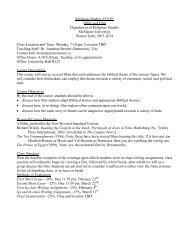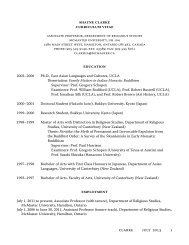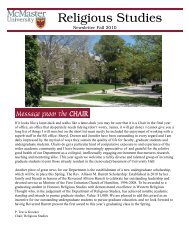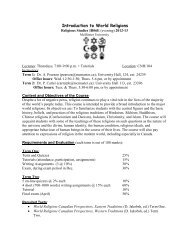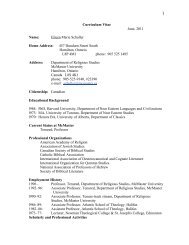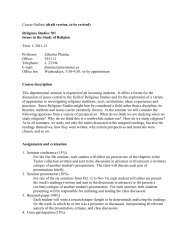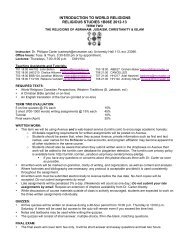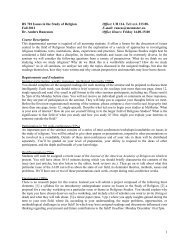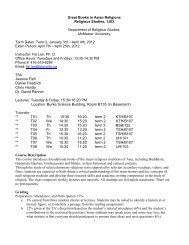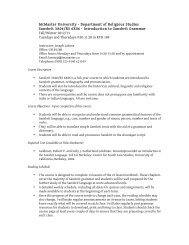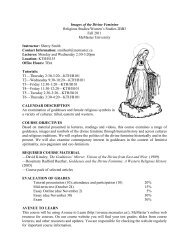RS 4I03 FINAL.pdf - Department of Religious Studies - McMaster ...
RS 4I03 FINAL.pdf - Department of Religious Studies - McMaster ...
RS 4I03 FINAL.pdf - Department of Religious Studies - McMaster ...
You also want an ePaper? Increase the reach of your titles
YUMPU automatically turns print PDFs into web optimized ePapers that Google loves.
1<strong>Religious</strong> <strong>Studies</strong> <strong>4I03</strong> Topics in Biblical <strong>Studies</strong>: Advanced SeminarFall Term, 2011Topic: Jewish Women in the Greco-Roman PeriodTuesdays, 7:00 – 9:45 pmUniversity Hall 122Instructor: Dr. Eileen SchullerEmail: Schuller@mcmaster.caPhone 905 525 9140 #23390Office: University Hall 119Office hours: Thursday morning 10:00 – l2:00; other times by appointmentCourse Content: a discussion <strong>of</strong> selected texts and topics in Second Temple Judaism,with a specific focus on literature and social history related to women.Overview <strong>of</strong> the term: (details may change over the course <strong>of</strong> the term)1. Weeks 1 & 2: introductory topics and background2. Weeks 3 – 10: each class will consist <strong>of</strong> three components:(a) “Book/Primary Text <strong>of</strong> the Week”: (7:00 – 8:00/15 pm)Student Presentation: women in this text; general issues and specificquestions; one or two specific passages; questions for discussionAn outline <strong>of</strong> your presentation, some questions for discussion, and a list <strong>of</strong> thesecondary works you have consulted (usually 2-4 books or articles) is to besubmitted to the instructor by Sunday evening.(b) Discussion <strong>of</strong> an assigned article on a specific topic, theory, problem:(30-45 minutes)Over the term, each student will write 5 written responses, each <strong>of</strong> 400-500 words. After a brief paragraph stating the content and purpose <strong>of</strong> thearticle, discuss two specific points or issues that you have foundparticularly insightful or particularly problematic, or some point that youwant to relate to other readings and texts, or some point needing furtherdevelopment and explanation. These responses will be taken up in theclass discussion and then handed in.( c) Introduction <strong>of</strong> the book to be read in the coming week: Schuller,(final 20 minutes)3. Weeks 11 & 12: presentation <strong>of</strong> student research on a topic <strong>of</strong> your choice
2Course Outline:Sept. 13: Introduction to the SeminarSept. 20: Background to Second Temple Judaism, Women in the Apocryphaand PseudepigraphaReadings: “Judaism,” by J. VanderKam, in The New Interpreter’s Dictionary <strong>of</strong>the Bible, pp. 425-435“The Culture <strong>of</strong> Early Judaism,” by Amy-Jill Levine, in The New Interpreter’sBible One Volume Commentary, pp. 979-982“Women” by Tal Ilan in Eerdmans Dictionary <strong>of</strong> Early Judaism, pp. 1346-49“Women in Early Judaism: Twenty-Five Years <strong>of</strong> Research and Reenvisioning”Susan Marks, Currents in Biblical Research, 2008, pp. 290-320Sept. 27: Change in class time - to be negotiated (because <strong>of</strong> the Hooker VisitingPr<strong>of</strong>essor Lectureship at 7:30 pm)The Book <strong>of</strong> TobitArticle: Article: “Second Temple Judaism, Jesus, and Women,” by Amy-Jill Levine, Biblical Interpretation 2/1 (1994) 8-33 with special attentionto pp. 8-20Oct. 4:The Book <strong>of</strong> Ben Sira (plusselected passages on Lady Wisdom: Proverbs8, Wisdom <strong>of</strong> Solomon 7-10, Baruch))Article: “Reading (for) Gender,” Caroline Vander Stichele and ToddPenner, Contextualizing Gender in Early Christian Discourse: ThinkingBeyond Thecla, T & T Clark, 2009, 178-204, 219-225Oct. 11:The Book <strong>of</strong> Judith and the Book <strong>of</strong> SusannaArticle: Ross Kraemer, “ Women’s Authorship <strong>of</strong> Jewish and ChristianLiterature in the Greco-Roman Period,” in Women Like this: NewPerspectives on Jewish Women in the Greco-Roman World, ed. A-J.Levine, 221-42Oct. 18:The Book <strong>of</strong> Jubilees (selected passages)Article: “Miriam’s Mistake: Numbers 12 Renarrated in Demetrius theChronographer, 4Q377, Legum Allegoriae and the PentateuchalTargumim,” Hanna Tervanotko, in Embroidered Garments: Priests andGender in Biblical Israel, ed. D. W. Rooke, Sheffield 2009Oct. 25:Philo, De Vita Contemplativa; on the Therapeutae
3Article: “Parents and Children: A Philonic Perspective” Adele Reinhartz;The Jewish Family in Antiquity, S. CohenNov. 1Texts from the Dead Sea Scrolls: The Rule <strong>of</strong> the Community, the GenesisApocryphon, the Damascus Document, selected shorter halakhictexts;Article: Maxine Grossman: “Women and Men in the Rule <strong>of</strong> theCongregation: A Feminist Critical Assessment,” in Rediscovering theDead Sea Scrolls, ed. M. GrossmanOR, Joan Taylor, “The Cemeteries at Khirbet Qumran and Women’sPresence at the Site,” DSD 6 (1999), 285-323Nov. 8The Testament <strong>of</strong> JobArticle: “Epigraphic and Documentary Evidence on Women in the Greco-Roman World”, Ross Kraemer, SBL Seminar Papers 1986Nov. 15:The Book <strong>of</strong> Joseph and AsenethArticle: “Doing Like Jews, Or Becoming a Jew? Josephus on WomenConverts to Judaism” Daniel Schwartz Jewish Identity in the Greco-Roman World, ed. J. Frey, D. Schwartz and S. GripentrogNov. 22 (no class) Class to be made up - time to be negotiatedNov. 29: Presentations <strong>of</strong> research (final two classes)? Make-up class - presentations <strong>of</strong> researchDec. 13:Final paper due: to be submitted to the instructorAssignment <strong>of</strong> marks:Weekly preparation and participation in the seminar discussion: 20%Article responses: five over the course <strong>of</strong> the term: 20%Presentation on the “Book <strong>of</strong> the Week”: 20%Research paper (10-15 pp.); oral presentation and written paper: 40%
4Reading Materials for the Course:Students will need a copy <strong>of</strong> a Bible that includes the Apocrypha (the expandedApocrypha). The HarperCollins Study Bible or The Oxford Study Bible arerecommended.Copies <strong>of</strong> The HarperCollins Study Bible are available in Titles under <strong>RS</strong> 2B03COU<strong>RS</strong>EPACK: a coursepack is (will be) available with some <strong>of</strong> the assigned readings;most journal articles are available electronically through Mills Library.We can discuss in the first class whether an expanded coursepack would behelpful for texts in the latter part <strong>of</strong> the courseMany <strong>of</strong> the supplementary and optional readings, plus materials that will be helpful foryour research essays, will be placed on RESERVE in Mills Library.At present, use Classic Catalogue (at http://library.mcmaster.ca) to access Reserves.This is a 24-hour reservation (NOT the 2-hour RESERVE).AccommodationIf you require special accommodations, please contact the Centre for StudentDevelopment for more information and the appropriate forms: http://csd.mcmaster.ca/Please arrange to meet with the instructor by September 30 to make arrangements foraccommodation and for signing formsUniversity mandated:ACADEMIC INTEGRITY LANGUAGE FOR COU<strong>RS</strong>E OUTLINESYou are expected to exhibit honesty and use ethical behaviour in all aspects <strong>of</strong> thelearning process. Academic credentials you earn are rooted in principles <strong>of</strong> honesty andacademic integrity. Academic dishonesty is to knowingly act or fail to act in a way thatresults or could result in unearned academic credit or advantage. This behaviour canresult in serious consequences, e.g. the grade <strong>of</strong> zero on an assignment, loss <strong>of</strong> creditwith a notation on the transcript (notation reads: “Grade <strong>of</strong> F assigned for academicdishonesty”), and/or suspension or expulsion from the university. It is your responsibilityto understand what constitutes academic dishonesty. For information on the varioustypes <strong>of</strong> academic dishonesty please refer to the Academic Integrity Policy, located atwww.mcmaster.ca/academicintegrityThe following illustrates only three forms <strong>of</strong> academic dishonesty:1. Plagiarism, e.g. the submission <strong>of</strong> work that is not one’s own or for which other credithas been obtained.2. Improper collaboration in group work.3. Copying or using unauthorized aids in tests and examinations.
5Modification <strong>of</strong> Course: (Senate-approved notation)The instructor and university reserve the right to modify elements <strong>of</strong> the course duringthe term. The university may change the dates and deadlines for any or all courses inextreme circumstances. If either type <strong>of</strong> modification becomes necessary, reasonablenotice and communication with the students will be given with explanation and theopportunity to comment on changes. It is the responsibility <strong>of</strong> the student to checkhis/her <strong>McMaster</strong> email and course websites weekly during the term and to note anychanges.E-mail correspondence Policy (Faculty <strong>of</strong> Social Sciences Notation)Effective September 1, 2010, it is the policy <strong>of</strong> the Faculty <strong>of</strong> Social Sciences that all e-mail communication sent from students to instructors (including TAs), and from studentsto staff, must originate from the student’s own <strong>McMaster</strong> University e-mail account. Thispolicy protects confidentiality and confirms the identity <strong>of</strong> the student. It is the student’sresponsibility to ensure that communication is sent to the university from a <strong>McMaster</strong>account. If an instructor becomes aware that a communication has come from analternate address, the instructor may not reply at his or her discretion.Avenue to Learn.Access to Avenue to Learn is through your <strong>McMaster</strong> email account. Students should beaware that when they access the electronic components <strong>of</strong> this course, privateinformation such as first and last names, user names for the <strong>McMaster</strong> e-mail accounts,and program affiliation may become apparent to all other students in the same course.The available information is dependent on the technology used. Continuation in thiscourse will be deemed consent to this disclosure.



